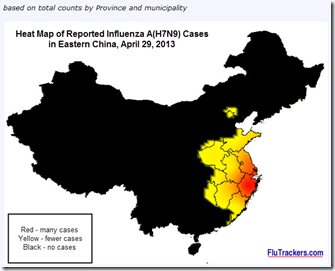H7N9 Affected areas – Credit Laidback Al FluTrackers
# 7343
Two months and 130+ cases after we first learned of the emerging H7N9 virus (see More Details Emerge On Shanghai H7N9 Case), China today has announced the termination of their emergency response to the H7N9 outbreak.
Only one new case has been reported in recent weeks (see Beijing Reports 2nd H7N9 Case), a dramatic drop in cases which has been attributed to the closing of live markets and the return of warmer weather.
Few experts believe the virus has gone for good, however, and many have deep concerns it will return once live markets are reopened, or when cooler temperatures return in the fall.
So two reports this morning.
First, the announcement of the end of the emergency response, followed by a statement from the Chinese CDC warning of the dangers of re-opening live markets.
H7N9 emergency response program ends
Updated: 2013-05-31 10:43( chinadaily.com.cn)
All areas affected by the H7N9 bird flu have ended emergency responses as of May 28, xinhuanet.com reported.
The epidemic will be under routine monitoring as it has been deemed controllable and there has been no evidence of human-to-human transmission, the report said.
The Chinese mainland reported 130 confirmed H7N9 cases as of May 27, of which 36 ended in death.
The first case of human infection of H7N9 virus was announced in Shanghai on March 31, with 10 provinces and cities reporting cases in the following two months.
Shanghai was also the first city to call off the emergency response, on May 10, and Zhoukou city in Central China's Henan province was the last.
This next article is machine translated, and is slightly syntax-challenged.
Chinese CDC experts: do not advocate live poultry markets open
May 31, 2013 07:23:00
Source: China News NetworkOriginal title: China CDC epidemiologist: do not advocate live poultry markets open
BEIJING, Suzhou, May 30 (Reporter Wu pupil) in recent days, some farmers market in Suzhou city of live poultry stalls have opened, but was immediately ordered to stop trading the local business sector. 30, China CDC epidemiologist Zeng Guang, chief expert came to Suzhou, the city's disease control and medical personnel to carry out the lecture. Turning to whether to suspend the live poultry trade liberalization, the experts made it clear that not support it.
Beijing health authorities 28 Nisshin confirmed case of human H7N9 avian influenza infection, the discovery of the confirmed case patient was a 6-year-old boy. People have been previously rumored, H7N9 avian influenza virus in the summer may die. Zeng Guang said that at present, H7N9 virus transmission is not clear, but for cooked chicken, ducks and other poultry products do not need to panic.
Speaking of whether you want to pause live poultry trade liberalization, the experts made it clear that not support it. "Open live poultry market, I do not advocate." Zeng said.
Zeng Guang, also introduced in the world, live poultry market in the country, are very few in the country. "They are duck, designed duck, chicken, special chicken, it's not coming from the retail feeding. Kill, do not kill their own people, in the professional protection, the central slaughtering, because in the recycling process, prone to mutation . "
Affected by avian influenza, Suzhou since April 8 banned live poultry trade, has not been lifted
There are strong cultural and economic factors at work here, and so it remains to be seen how long, and how effectively, authorities can keep live markets closed in Eastern China.
While the news out of China has slowed, the World Health Organization, in their H7N9 GAR Update of two days ago, warned:
Until the source of infection has been identified and controlled, it is expected that there will be further cases of human infection with the virus.
All of which suggests that while cases may be few and far between in the short run, the threat posed by the virus has not disappeared.
